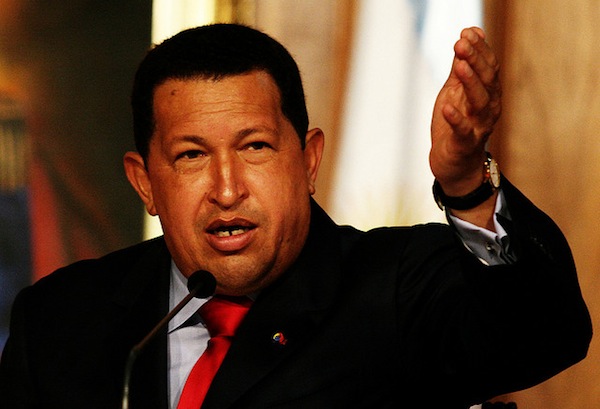Hugo Chavez Dead At 58


Controversial Venezuelan President Hugo Chavez is dead at 58, having succumbed to an unidentified cancer Tuesday afternoon. Chavez, who was recently re-elected to a fourth term, took to power in the South American nation in 1999 thanks to overwhelming support from Venezuela’s impoverished population. Although the fiery, leftist personality often clashed with US capitalist ideals, his policies actually did a lot of good for the nation that loved him. According to the World Bank, the number of Venezuelans living in poverty fell from 62 percent in 2003 to just 29 percent in 2009—an incredible dip by anyone’s standards. Meanwhile, from 2001 to 2007 illiteracy in the nation fell from 7 to 5 percent.
How did Chavez manage such feats? Upon his rise to power, Chavez launched a plan to remake Venezuela into a socialist society. He even renamed the country the Bolivarian Republic of Venezuela after his idol Simon Bolivar, who won many South American countries their independence in the early 1800s.
“After many readings, debates, discussions, travels around the world, etcetera, I am convinced — and I believe this conviction will be for the rest of my life—that the path to a new, better and possible world is not capitalism. The path is socialism,” Chavez said on his weekly television program in 2005.
Venezuela’s largest export is, of course, oil, accounting for about 85 percent of its total exports. The nation is the world’s fifth largest crude oil exporter. Before Chavez, Venezuelan leaders tried to privatize the industry and US corporations held significant control. But Chavez nationalized much of the industry under a state-run oil company and redirected much of the nation’s oil riches to social programs aimed at helping the poor.
Chavez also placed a great emphasis on educating the citizens of Venezuela, offering free education from daycare through university. In fact, Venezuela places fifth in the world and second among Latin American nations with the largest proportion of university students—an unbelievable one out of every three Venezuelans are enrolled in some sort of educational program.
So why was he categorized as such a bad guy? His people loved him and he did great things for them, right? Maybe, but he also tightly controlled any media reports of his government, and repressed politicians and private media that opposed him, so who really knows. Plus, he allied himself with some pretty skeezy characters, including Iran’s Mahmoud Ahmadinejad, Libya’s Muamaar Qaddafi and Iraq’s Saddam Hussein. One of Chavez’ closest allies and mentors was Fidel—and now Raul—Castro of Cuba, with whom he agreed to supply a steady line of oil in exchange for the island nation’s sophisticated medicine.
And, of course, he had some pretty rotten things to say about the United States. Chavez often referred to the US as the “empire,” and reserved some particularly well-aimed jabs for former President George W. Bush, calling him a “donkey,” “the kind of vacations,” and “the devil.”
“The devil came here yesterday,” Chavez said of Bush in a 2006 speech before the UN General Assembly. “And it smells of sulfur still today.”
But can we really fault the guy for saying things half of America has said before? No, the real reason Chavez has been demonized is he stands for everything that America isn’t. So his government isn’t like ours. It’s socialist. He made allies of our enemies. But besides the high crime rate (which isn’t isolated to Venezuela), it worked well for his people. They re-elected him three times, didn’t they? So let the guy rest in peace.
[Image via Flickr/¡Que comunismo]









































